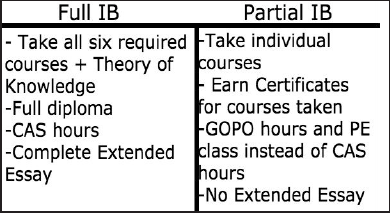By Isabel Kettler – When a current Lincoln High student who wishes to remain anonymous was a junior in their first year of International Baccalaureate classes, they realized that something had to give.
The IB workload in addition to their heavy involvement in extracurricular activities proved to produce an unproductive kind of stress. Some people can handle that type of stress really well, and some other people can’t, but they just didn’t want to stress themselves out like that. But how can one go about challenging themselves without pushing their stress levels over the edge?
The student had a solution: Partial IB. Partial IB is the informal term for a system in which students take select IB classes and earn certificates of completion instead of taking all the courses required for the full IB diploma. It’s much like taking individual AP classes, giving students more flexible schedules while still allowing them to be in classes that challenge them academically.
Which is why it’s generally surprising to hear about the controversy surrounding this way of doing the program. What controversy? Students say they’ve been discouraged from trying to take select IB classes.
The common idea is that students who only take select IB classes have “given up,” but that’s not true. They’ve chosen to focus on areas that truly pique their interests without having to take subjects that they do not find fulfilling in demanding classes.
While students taking only a few IB classes do not have to complete their Creativity, Action, and Service (CAS) hours, they do take Physical Education, and they fulfill their Government and Politics service hours. Courses that aren’t taken at the IB level are often still taken, but at the standard district level. In fact, the International Baccalaureate organization offers what could be seen as a more formalized version of partial IB, the Career-related Programme, wherein students take at least two courses from the Diploma Programme that relate to a career they want to pursue, a common goal of Partial IB.
So, why the stigma? International Baccalaureate Coordinator J.P. Caruso says it’s because, “We believe Full Diploma offers a better post-secondary experience,” emphasizing that IB Diploma graduates often say that they are more prepared for the rigor they will face in college. Caruso specifically cited the report Diploma Programme students’ enrollment and outcomes at US postsecondary institutions 2008-2014. This study makes an excellent case for the Diploma Programme, but it’s also necessary to note that in the full study, Liz Bergeron, Ph.D. said, “Students who enroll in just selected IB courses, without participation in the full programme are excluded [from the results presented in the study].” So while we have figures showing the progress of Full Diploma participants, we lack data about their non-Full Diploma peers.
Green puts it more in the context of Lincoln High. “Honestly, [the push for more Full IB students is happening] because the program is growing, because there are so many people in the program.”
If all the kids who want to take Partial IB classes stay in the program, the class sizes would swell, making it difficult for IB teachers to address the individual learning growth of the students. Another factor Green mentioned was cost. IB tests range around $800 for each Full Diploma student because the papers are shipped all around the world to be scored. The Lincoln Public Schools district pays for the costs of the IB Exams, whereas the cost of the AP exams, which usually cost around $90, are paid for by the individual students.
Yet another popular point of contention in the Partial vs. Full IB debate is how college admissions boards view the two. Putting aside the question of whether or not that should be the focus of the program, it must be noted that the terms for rewarding college credit based on scores in AP or IB classes varies widely from school to school. But it’s generally accepted that, one IB class is equivalent to one AP class.
Which raises the question: Why not just take AP classes? The decision lies not in the the idea that one course is more advanced than the other. “There is a common idea… that IB classes are up here and AP classes are down here, and that’s just not the case,” Caruso said.
Though the programs are identical in terms of rigor, they commonly differ in emphasis. The International Baccalaureate Program emphasizes writing in more areas, and very few multiple choice questions show up on exams. Of course, with classes like AP Language and Composition, those types of questions would show up on assessments also.
Course content also tends to vary “[IB History] goes into much more depth about the topics worldwide…” Counselor Green said. “Whereas, with the AP US History, it’s going to be 500 years you have to go through really quickly and know little bits about.”
Green would add that if an alternative for a common subject like English were available, then students should take advantage of that, but if there were no AP alternative, as in the case of IB Theatre, she would welcome students taking the IB course. The choice comes to what students want to emphasize in their learning.
Green and Caruso emphasize that students will never be forced to take courses that they feel do not suit them.
“Am I saying that students are never allowed to take individual IB courses? Absolutely not. But if you were in partial IB and you had that AP alternative, why not take it?” Green said.
Ultimately, both agree that the choice lies with the student, who will always be able to gauge the amount of stress that they can handle. While Caruso says that the program was meant to be taken in full, he welcomes the growth in the program and its importance to Lincoln High.
“Growth is not a bad thing,” Caruso said. “It means a lot of kids are being exposed to great ideas.”
